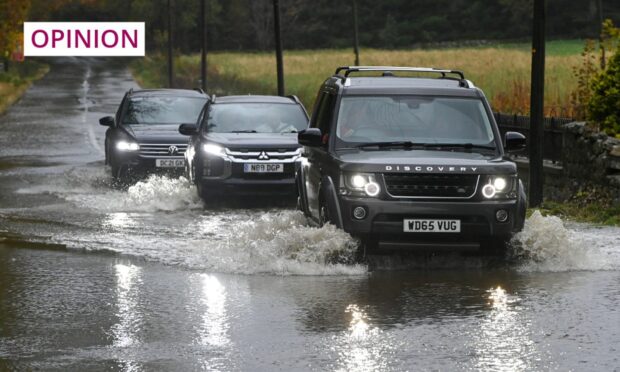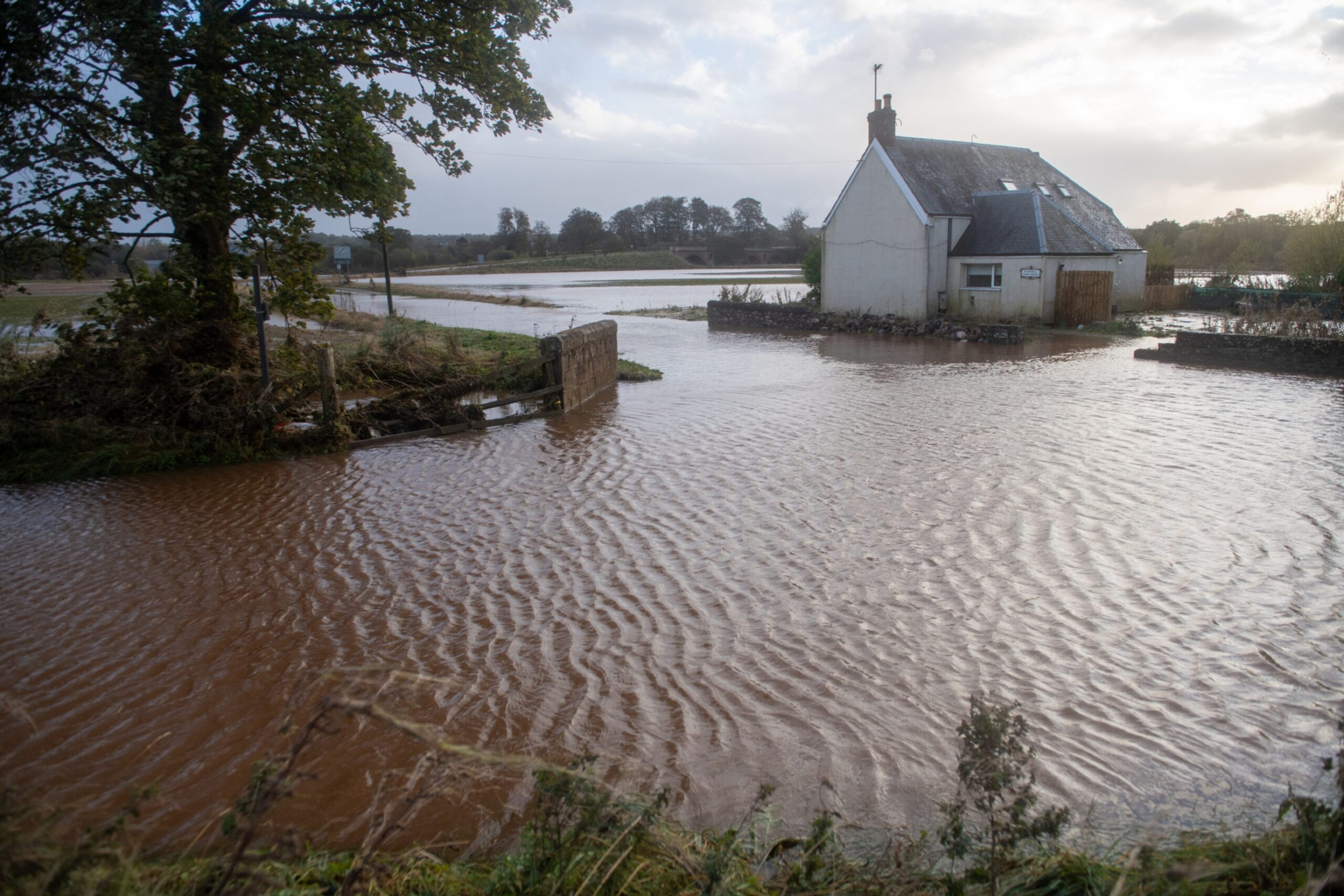If Storm Babet had paused for a few seconds as she went about her dreadful work, she might have scrutinised two tiny figures in particular scurrying about below.
It was us.
A clueless couple who turned reason on its head and travelled towards the epicentre of the storm instead of fleeing it like any normal person.
Having observed our erratic ant-like behaviour from on high, she would have most likely curled her lip and spat extra venom in our direction. What on earth were we playing at?
As the terrifying alert had reached its zenith on a tragic, doom-laden Friday morning just over a week ago, we found ourselves bang in the middle of it. Poor planning was probably a factor; raw emotions overpowering reasoned thought was another.
We decided to venture south on urgent family health matters; it’s for you to decide if you agree we were justified in that conclusion.
Along the way, we endured a detour to hell and back.
We were kind of blown into Brechin and Forfar accidentally – the reddest part of the red alerts by far – as we battled to reach Dundee on the first leg of our 450-mile journey. News reached us that it was taking some drivers two and a half hours to get through from Aberdeen.
A day later, my blood ran cold as I tried to catch up with the apocalyptic events we had drifted into in Angus by checking my online subscription with The P&J.
There it was on the digital front page – a dramatic photograph of a narrow country lane pounded, surrounded and cut off by flood water. It was taken in the Mearns village of Marykirk, after the floods had created something like a deep new estuary from the sea in what were open country fields the day before.
We were stuck – and scared
We and a few others in a mini-convoy of strangers skirted away down here because a dangerous damaged bridge on the coast road had been sealed off. The conditions were so hellish that a man trapped in a car had been tragically washed away near here in the early hours.
At a nearby spot and around the time when the picture was taken, we were stuck there, too.
It was about 9.15am, and we stared with a growing sense of dread at the same doomsday scene the photographer saw through a camera lens. It was the view from our car, where we came to a halt in the lane as it dipped downhill and disappeared under swirling floodwaters a couple of hundred yards ahead.
Frankly, we were scared. We had probably already pushed our luck too much in trying to find a way through to the south after the A90 was closed on safety grounds.
A rescue helicopter zigzagged low above us, looking for something. We hadn’t yet heard about the tragedy of the man swept away.
I had a terrible premonition that if we ventured further down the lane, my wife and I – and little Mindy the miniature schnauzer in the back – would have ended up on our car roof, waving to the helicopter to rescue us.
What waste of resources, you might say, given the tragic circumstances which were
unfolding. Idiots, I hear you cry.
Like a scene in a Hollywood survival movie
A mini-conference ensued with our little convoy of desperate travellers looking for a way out. Scenes resembling one of those Hollywood survival movies where people are thrown together while trying to escape the full force of nature. A maze of false trails, dead ends and blocked roads under a pervading sense of impending doom.
I performed a scary three-point turn as floodwaters lapped around – scarier than even the one during my driving test.
There is a fine line to be trodden over restricting freedom of movement in a democracy
I wondered how the woman called Babet felt after reportedly putting her name forward in Holland for a storm name – because she was born in one.
As with Covid pandemic restrictions, police and Traffic Scotland were warning people not to travel: stay at home.
But, as we learned then, there is a fine line to be trodden over restricting freedom of movement in a democracy. Therefore, the words “unless essential” are inserted into these warnings – quite rightly.
What else could we do?
In our desperate little group, we all had our reasons for being there.
An Aberdeen taxi driver was trying to take a couple to Edinburgh Airport to catch a flight. A race against time; they looked ashen-faced every time I glimpsed them through the car windows.
A news photographer – a breed who often put themselves on the line bravely to show the public what they deserve to see. But even he warned: “It’s too dangerous to go down that lane.”
And there was us.
Hospital doctors had called to warn that our most-loved elderly relative’s heart was almost giving out due to a worsening chronic condition.
What else could we do?
David Knight is the long-serving former deputy editor of The Press and Journal


Conversation